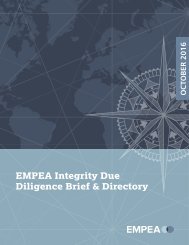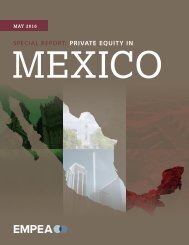Create successful ePaper yourself
Turn your PDF publications into a flip-book with our unique Google optimized e-Paper software.
Get Connected – Ease Scaling Up In Africa<br />
• Consider developing a mutual financial client and worker identification system that would provide AML and KYC<br />
passports. Some jurisdictions, notably Estonia, are working hard on providing ‘identity’ services for global use. Such<br />
an identity system would smooth entry into Africa (one AML or KYC check for a few dozen countries) from outside,<br />
and smooth cross-border working.<br />
• Engage universities directly with financial services, also under appropriate international accreditation, to lay the<br />
foundations for future financial services expertise. Much work needs to be done to integrate vocational training with<br />
academic, e.g., graduating in accounting with accounting qualification tests already completed, equally actuarial,<br />
banking, or finance; pushing universities to accept vocational qualifications as credit for higher than entry level<br />
joiners; or targeting university success partially on job placement and salaries. An FTQI should equally promote the<br />
recognition <strong>of</strong> university qualifications, e.g., mathematics or statistics, for part <strong>of</strong> vocational qualifications.<br />
• Use cross-recognition and visa rules to connect more with global pr<strong>of</strong>essional and financial services firms to work<br />
across Africa. Can a major accountancy practice or bank send pr<strong>of</strong>essionals freely across the region, African or not.<br />
• Develop a global dialogue on African financial services using a portal’s discussion groups to unite the region<br />
on topics, unite practitioners and regulators, unite academics and the industry; work on developing strong links with<br />
international fora—Geneva Association (insurance), SWIFT, IMF, etc.—especially consider not ‘African’ conferences<br />
but global financial conferences – and look to bringing in academics and financial intellectuals. Equally, the ability to<br />
consolidate African expertise when needed could build confidence and pride about regional capabilities, e.g., a South<br />
African pr<strong>of</strong>essor and a Nigerian investment manager along with a Kenyan quant publish a paper to help answer<br />
a World Bank question on how to price Congo forestry for sustainability, a paper that no specific country had the<br />
expertise to develop.<br />
Get Serving – Develop African Products<br />
• Consider ‘selling’ regulation, i.e., <strong>of</strong>fering investors additional supervision and inspection <strong>of</strong> their local investments<br />
or investment managers though for an additional fee. Such services could be run by the centre’s regulators and could<br />
provide local benchmarking information to investors. Donors could be particularly helpful in providing oversight and<br />
control for such services.<br />
• Establish and publish service benchmarks that help raise customer service standards across the region, e.g.,<br />
secret shoppers.<br />
• Consider developing FinTech Africa, an incubation centre for s<strong>of</strong>tware—given the African ‘leapfrog’ on mobile and<br />
payments, perhaps Africa can leapfrog in insurance or blockchain technologies.<br />
• Consider how financial literacy might actually aid financial centre development, e.g., training games for children<br />
(such as CISI’s CISIext) or getting finance into secondary school curricula. This could be a high-impact pathway<br />
for donors.<br />
<strong>Conduits</strong> <strong>of</strong> <strong>Capital</strong> – Onshore Financial Centres and Their Relevance to African Private Equity<br />
| 133





